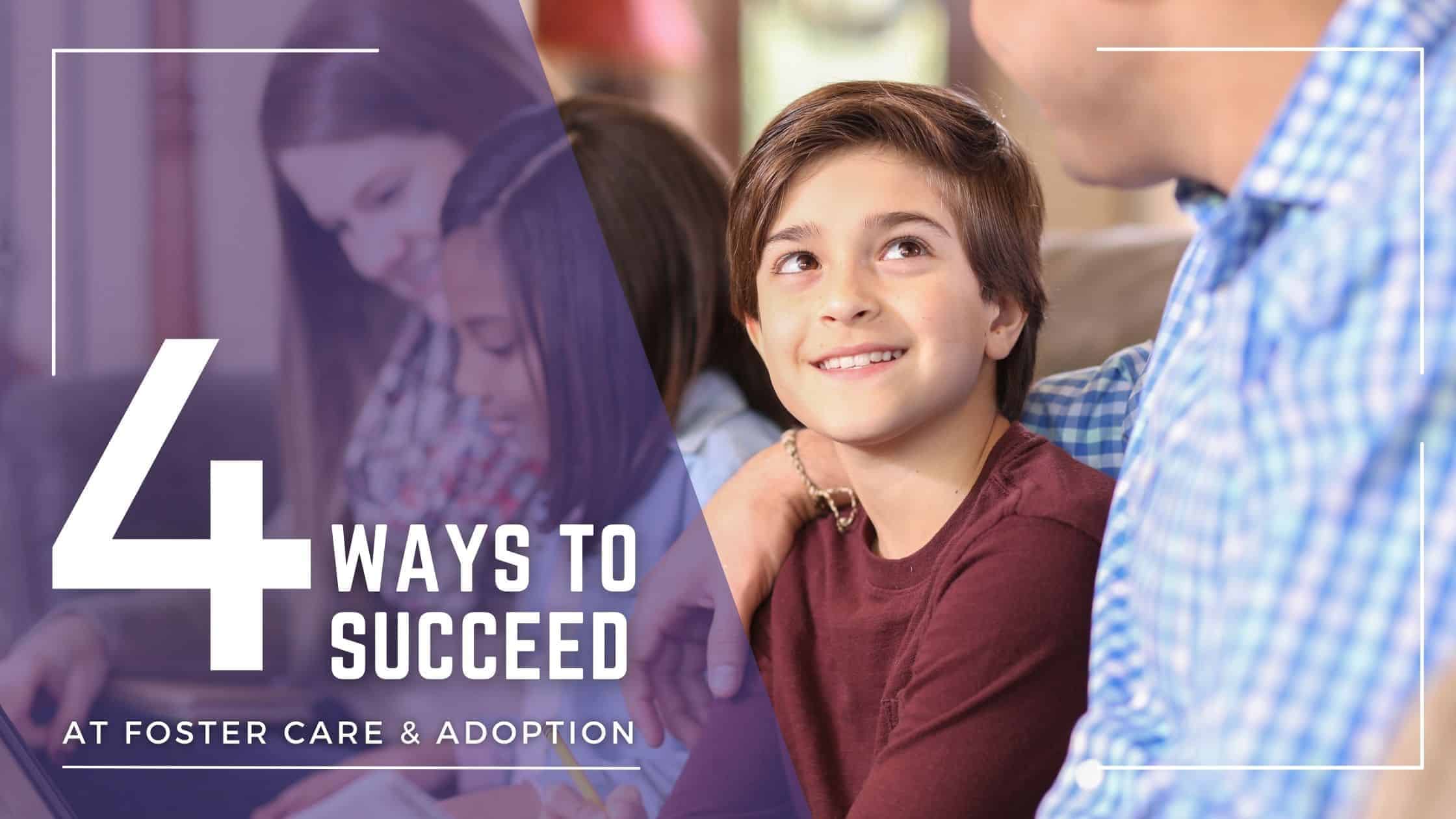Have you heard any of these sentences as a foster or adoptive parent?
- “Adoption is such a beautiful thing.”
- “You must be a saint to be a foster parent.”
- “Those kids are so blessed to have you.”
As a former foster parent and adoptive mom of twelve children, now adults, I used to cringe every time I heard those words. I learned quickly that foster care and adoption are entrenched in and surrounded by hurt, loss, and grief from every angle. While there is also great reward, it comes after maneuvering through layers of pain. However, there are ways to succeed at foster care and adoption.
In John 10:10, we read these words: “The thief comes only to steal and kill and destroy.”This thief, the enemy of our souls, definitely attacks all members of the adoption/foster care triad with attempts to steal, kill, and destroy our hope, peace, and joy.
To Succeed at Foster Care and Adoption, Understand the Enemy’s Tactics
Every foster care and adoption story begins with pain. A mother, either expecting or attempting to parent her child, either concludes or is told that she cannot do it. It is difficult to fathom that kind of conclusion, and the stories of these families and their stress are heartbreaking. The enemy is right there – that thief who comes to do nothing good.

The Enemy Targets the Biological Family
Hope is stolen when a biological family goes through the loss of their child or children. A friend I met through CarePortal explained how it felt when her children were put into foster care. She mentioned how she slowly lost hope as she went through multiple court hearings. Each time she thought she was making progress, she had a setback. It took a village of committed professionals and church members to allow her to make it through this challenging season until reunification became a reality.
For many biological families, dreams of successfully raising the child they have given life are dashed. Their hearts are plagued consistently with a sense of failure and hopelessness as they come to terms with this loss. Often they have nowhere to express their pain as they are blamed, criticized, and sometimes shunned for the loss of their child. It is impossible to see a future where they can be okay with what has transpired.
Restless nights, sleep loss, depression, and anxiety sneak in as the thief robs their peace. Desperation to do the impossible — rewrite history and undo choices made — is consuming. Wandering through a starkly silent house yearning for children’s voices haunts the birth parent, whose mind reels with self-recrimination. Inner peace is squeezed out by reverberating chaos.
Without hope and peace, joy is also stolen. Seeing other parents with their children, especially when those interchanges are positive and happy, brings fresh stabs of pain. For those who move on, learn healthy parenting, and experience positive moments, the enemy is there to accuse, “You don’t deserve to be happy after what you’ve done.”
The Enemy Targets the Adoptee or Foster Child
The enemy’s torment is also present for the adoptee or foster child, who is expected to feel “fortunate” or “blessed” to be in a new family. In speaking with a few of our children who are now adults, we learned that their recollection of their primary emotion in coming into our family was loss. While they knew that they should be grateful, they were wrapped up in their own grief and could not handle, as pre-teens, the complexity of those two emotions at the same time. Anger and frustration were the emotions closest to the surface, and yet they felt some guilt for not being able to be as grateful as they knew they should be.
They may place hope in a future reunification with a fantasy parent who has been transformed and ready to love fully. The dream often leads to disappointment. Hope is slowly extinguished as they reach for a world they are powerless to create: The opportunity to spend time with, live with, and be loved by the person who gave them birth. The void in their heart is real, a constant reminder of hope crushed.
Questions that Steal Peace
The enemy also steals internal peace in the form of questions.
- “What did I do?”
- “Is something wrong with me?”
- “Why didn’t the person who gave me life care enough to do what was needed to keep me?”
- “Am I unlovable?”
- “Why do I have to live with people who obviously do not look like me?”
- “Why am I the ‘different one’?”
Youth in foster care often conclude, “There must be something wrong with me.”
With evaporated hope and eviscerated peace, joy is stolen from the adoptee who fixates on the past. Enjoying the blessings of today in the face of traumatic separation is difficult, particularly when the adoptee or foster child remembers their biological family and is plagued with worry about how or where they are. They may feel guilty for having better clothes, more reliable transportation, and a nicer home than their family of origin. They may feel uncomfortable enjoying these benefits if they feel unworthy or blame themselves for the separation.
The Enemy Targets Foster and Adoptive Parents
It’s not only biological family members and children who are fostered or adopted who are targets of the evil one. The adoptive parents are a prime target for the enemy. At times we have felt that our home, which we were attempting to fill with love, was actually full of the opposite. This cute story illustrates one of those times.
It was April of 2000, and our youngest child was four years old. The day had been long, and it was still twenty minutes before supper. It seemed as though every child I called mine at that time was angry with me for one reason or another, and I was exhausted. Our youngest came into the kitchen asking for food because he was so hungry he “couldn’t take it anymore.”
“No honey,” I said, in my most patient voice, “We’ll be having supper in a little while.”
“I HATE you,” he exclaimed.
Feeling like almost everyone did at that moment, I sighed, “Oh, son, join the club!”
“What??” he screamed incredulously. “I don’t want to be in your club. I hate you!”
Creating Realistic Expectations
One of the challenges of adoptive parenting is unrealistic expectations. Many step forward to be foster or adoptive parents because God has called them to step into this space to “care for orphans … in their distress” (James 1:27). They may believe that if God calls, He is going to make everything go smoothly to validate the call, or even as a reward for accepting the call. This is a lie of the enemy as well. Few roads are more difficult to navigate than parenting children born to someone else, whose history ensures a battle with demons of the past. Adding mental illness, childhood trauma, and prenatal chemical exposure to the context, the complexities of resource parenting can seem overwhelming.
For even the most resilient, the stealthy thief sneaks in to pilfer hope. It may not be a daily occurrence because some days are better than others. Most adoptive and foster parents begin their journey with hope for a happy and bright future for their newly welcomed children. Slowly but surely, over the life cycle of a child, hope may erode. Children may become more challenging to parent. They may make soul-crushing decisions that irrevocably change the future, for themselves and their parents.
Clinging to Hope and Joy
When hope fades, the enemy wrests away peace, capitalizing on a child’s multiple challenges to cause relentless turmoil. Children from hard beginnings, comfortable with and accustomed to chaos, recreate it in their new homes, jarring parents into a new reality. As external peace fades, the enemy chips away at internal serenity with nagging questions like, “What were we thinking? How are we ever going to get through this?” The emotional roller coaster of highs and lows, the maze of court hearings, paperwork, IEPs, residential care, psychiatrists and therapy, and the verbal taunt of “You’re not my real mom/dad” can lead to a life absent of peace.
Joys that strengthen every healthy family’s life together are hard to experience when parents are worn down and frazzled. And in those moments when joy momentarily peeks through the pain, the enemy lies that it will never last. He taunts with thoughts such as “forget joy because more trouble is already on the way.” Anticipating the next incident of defiance or the new raging fit, even committed parents can overlook an authentically joyous moment. Slowly sinking into an overwhelmed state, parents may not have the strength to discover joy.
4 Ways to Succeed at Foster Care and Adoption
This is a sober reflection, isn’t it? But the good news is this: John 10:10 ends with Jesus’ promise, “I came that they may have life and have it abundantly.”

How is this even possible? Where is abundant life when joy, peace, and hope are obliterated? The enemy tatters our foundations and leaves us in bondage, but we can be free to experience the abundant life Jesus promised. This abundant life can help us to succeed at foster care and adoption. Beleaguered adoptive/foster parents, alienated biological parents, and conflicted adoptees can find liberation through four actions that form the acronym FREE.
1. Forgive
First, to succeed at foster care and adoption, we must forgive. All three members of the triad need to offer and receive forgiveness. The most important first step is to forgive ourselves for the guilt we carry. For biological parents, it may be to forgive ourselves for past choices or situations that prevented us from parenting our children. For adoptees, we recognize we are not to blame for our earlier traumas and understand that our inappropriate behaviors stem from what happened to us, not because something is wrong with us. Adoptive and foster parents must forgive ourselves for not being able to fulfill our self-imposed impossible expectations to be a perfect parent.
Once we have forgiven ourselves, we move forward to forgive the other members of this complex triad, asking God to help us understand that we are each doing our best with what we have had to work with. Ephesians 4:32 guides us to “be kind and compassionate to one another, forgiving each other, just as in Christ God forgave you.” Harboring resentment and feeding anger, we trap ourselves and create our own misery. In his song “Forgiveness,” Matthew West values forgiveness that will “clear the bitterness away. It can even set a prisoner free. There is no end to what its power can do. So let it go and be amazed by what you see through the eyes of grace; the prisoner that it really frees is you.”
2. Relinquish
Secondly, we must relinquish. Letting go of control is a first step toward recognizing that we cannot guarantee the outcome of our journey. The revised serenity prayer, anonymously attributed, instructs: “God grant me the serenity to accept the people I cannot change, the courage to change the person I can, and the wisdom to know it’s me.” Realizing we cannot control others allows us to relinquish them into God’s care. Reminding ourselves that God is God — and that we are not — will enable us to let go of our human tendency to over-function, control, or attempt to determine outcomes.
All of us benefit from vacating unrealistic expectations for ourselves and others, whatever our role in the adoption/foster care triad. We are flawed human beings always in need of grace. This spiritual truth allows us space to offer grace to our children, our parents, and our children’s first parents.
Bible Verses to Help Us Relinquish
We find freedom from the tyranny of controlling our life’s results when we lean into two assuring verses. The first verse is Jeremiah 29:11. “For I know the plans I have for you,” declares the Lord, “plans to prosper you and not to harm you, plans to give you hope and a future.” No matter how bleak our current circumstances are, as we recognize that God has good plans for us, we can trust that God’s outcomes are better than those we try to create for ourselves.
The second verse is Philippians 1:6: “He who began a good work in you will bring it to completion at the day of Jesus Christ.” Whoever our preoccupation — ourselves, our children, or our parents — everyone has a God-intended purpose. Everyone and everything has a purpose. Biblical Joseph (Genesis 50:20), after years of alienation from his family, was able to say to his brothers, “As for you, you meant evil against me, but God meant it for good.” In the adoption experience, many hurtful and even evil things may transpire, but we can be assured that God intends that, in the end, everything that happens is for our good.
3. Extinguish
Third, we must extinguish negative thinking to succeed at foster care and adoption. The enemy delights in sowing negative seeds into our minds, day and night. This thought hijacker’s primary strategy is to infest our thoughts with a sense of ineptitude, doubt, dismay, and hopelessness. Listening to these misrepresentations is debilitating. John 8:44 reminds us that the adversary is a liar and the father of lies. Heeding these voices leads to very dark places. We need to quench the negative meanderings and replace them with faithful aspirations. “Finally, brothers and sisters, whatever is true, whatever is noble, whatever is right, whatever is pure, whatever is lovely, whatever is admirable—if anything is excellent or praiseworthy—think about such things” (Philippians 4:8).
Reminding ourselves of how resiliency is formed can be helpful as we encounter negative thinking. This has been a game-changer for me as my husband and I have raised our children. Now that I’m pushing sixty pretty hard, I’ve concluded that resiliency is like a muscle. It is only built through hard times. Each time God brings us through an excruciating crisis, we acquire one more memory to build our foundation of endurance and faith. The more difficult episodes we encounter with trust in God, the heftier our resilience grows.
Building Strength and Resilience
A few years ago, I started seeing a trainer at the gym. From the trainer, I learned that there is a science to muscle development. Strength acquisition involves repetition, very slow increases, and consistency. It has to be intentional and, while it can be painful, it is never too painful when correctly accomplished. When I lift weights consistently, my message to myself is never: “I am so happy that my arms feel like they are going to fall off right now.” But when I see the results of the intentional activity and its expected discomfort, I feel pretty good about what I did to get to where I am. I learned to replace self-defeating language with an empowering reminder, “Wow, my arms are hurting. I bet I’m building muscle.” That’s how muscular strength develops. That’s how it works.
When we encounter hard times, our first response is never, “I’m so glad I’m going through this tribulation.” But reorienting ourselves to the anticipated result reminds us how pleased we will be when we get to the other side. That’s building spiritual muscle and resiliency. It’s how it works.
The Hope Cycle

Romans 5:3-5 describes the hope cycle. “Not only so, but we also glory in our sufferings, because we know that suffering produces perseverance; perseverance, character; and character, hope. And hope does not put us to shame, because God’s love has been poured out into our hearts through the Holy Spirit, who has been given to us.”
I have experienced this hope cycle multiple times in my life: (suffering produces perseverance, perseverance yields character, and character births hope). This spiritual process allows me to recognize God’s work in my life. When I encounter suffering, I can say, “God must be working in and through me right now.”
Understanding God’s plan to build spiritual resiliency and trusting the process are the solutions to vanquishing negative thoughts. These are critical to succeed at foster care and adoption. Replacing negativity with recognition of God’s goodness and His plan for making us stronger and better empowers us to venture forward.
4. Enjoy
Finally, we must enjoy the good times when they come. During the most difficult stages of our lives as parents, my husband and I had multiple conversations about whether we had the strength to get up and do it again the next day. I would always ask him to identify one moment of joy from the day. We always found at least one. Together God would remind us that there would be at least one more moment of joy to discover in the day to come.
Look for joy, whatever your current situation or your immediate emotions. Listen for the giggle of a happy child or sense the smile of a contented baby. Watch the colors of sunrise, feel the soft wind caress your face, or snuggle in the warmth of your pet. Review a favorite Scripture verse or hum a memorable song’s chorus. Recall the initial taste of a successful new recipe or bury yourself in the softness of a favorite blanket. Look for joy with an open mind, and you will find it. Give yourself permission to enjoy life. God never intended for us to go through life void of joy. Give thanks that Jesus came to give us life and to give it more abundantly.
Being FREE to Succeed at Foster Care and Adoption
In foster care and adoption, the thief is eager to steal, kill, and destroy our hope, peace, and joy. He does not want to see us succeed. The good news, though, is that Jesus offers us abundant life. Wherever we find ourselves within the adoption triad — biological parents, foster or adoptive parents, adoptees — we can experience fulfilling lives flowing with God’s abundance. We build spiritual muscles of resiliency as we forgive ourselves and others, relinquish our need to control, extinguish negative thinking, and enjoy the good around us. We are FREE to live this abundant life!




















